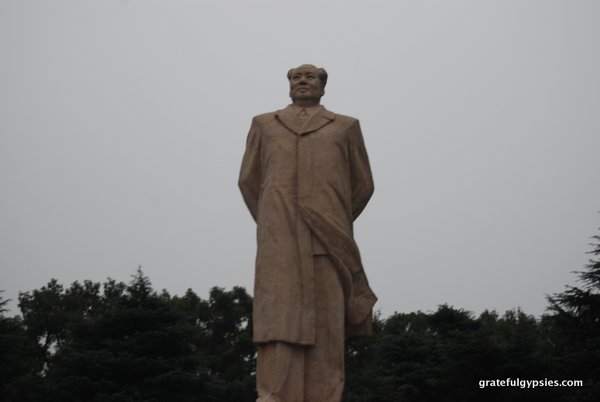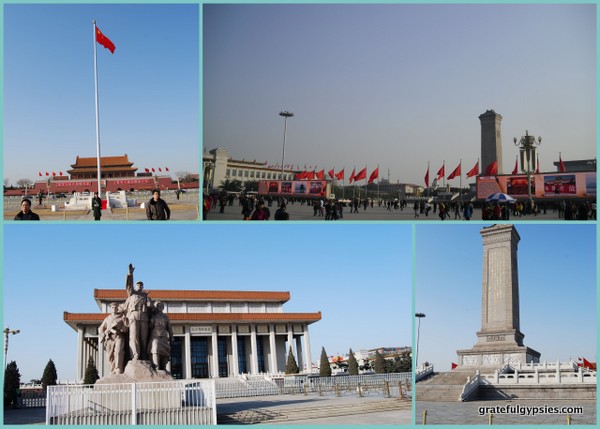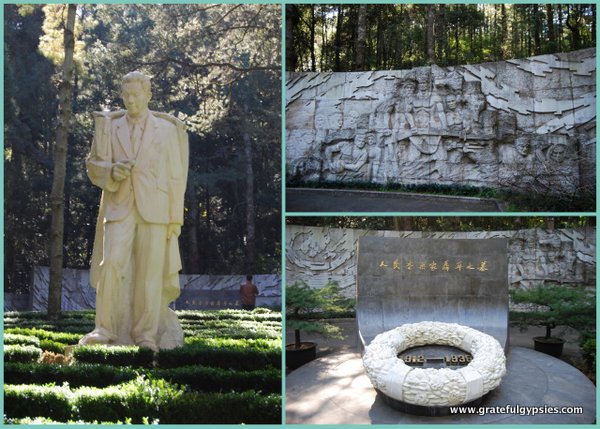China Turns 70 Posted by sasha on Sep 25, 2019 in Culture
October 1st is a very special day in China this year. Not only is it the country’s National Day (国庆节 – guó qìng jié), but it’s the 70th anniversary of the founding of the PRC. In this post we’ll take a closer look at the holiday and how the country is planning on celebrating as China turns 70.
The Founding of the PRC
On October 1, 1949, Mao Zedong (毛泽东 – Máo Zé Dōng) declared the founding of a new nation in a ceremony at Beijing’s famous Tiananmen Square (天安门广场 – tiān’ān mén guǎng chǎng). It would be called the People’s Republic of China (中华人民共和国 – zhōng huá rén mín gòng hé guó).
During his address, it is said that Mao proclaimed “The Chinese people have stood up” (中国人民站起来了 – zhōng guó rén mín zhàn qǐ lái le). It’s a great slogan and all. The only problem is, apparently Mao never said that at all…
Whether he said it or not, that day marked a new beginning for the country. After years of civil war with the Kuomintang (国民党 – guó mín dǎng) and years of suffering from the invading Japanese, China was finally united once again. The day was made a national holiday just a few months after the new China was born, on December 2, 1949.
A “Golden Week”
Along with the Spring Festival (春节 – chūn jié), National Day is one of two Golden Weeks (黄金周 – huáng jīn zhōu) in China. People get an entire week off of school or work to celebrate the holiday, but it’s a bit funny the way they manage the calendar…
You see, people really only get three days off for the holiday. The way that they make it a week-long holiday is by having people come into work or school for one day on the weekend before and another one on the weekend after. For example, this year people will have off from October 1-7, but they will go to work and school on September 29 and again on October 12. Sounds confusing? That’s because it is.
Anyways, the end result is mass chaos across the country as airports, train stations, and highways are jam-packed with people heading out on vacation (假期 – jià qī). Hit the road in the lead-up to National Day and you’ll see where the classic Chinglish idiom “People mountain people sea” (人山人海 – rén shān rén hǎi) comes from! It’s estimated that around 800 million people will travel during the Golden Week.
So where is everybody going? Well, one of the most popular destinations is Beijing. After all, Beijing is the capital of China (北京是中国的首都 – běi jīng shì zhōng guó de shǒu dū). People from all across the nation flock here to be a part of the flag-raising ceremony in Tiananmen Square to mark the occasion.
Even if you don’t make it down there at sunrise for the flag-raising, Tiananmen Square is very festive place to be throughout the Golden Week. I braved the crowds to celebrate the holiday way back in 2010. Check out some highlights of my experience from one of the first videos I ever made for the blog:
There’s much more than just the flag-raising ceremony going on this year, though. China is going all out with a massive parade featuring over 300,000 people. They’ve been doing rehearsals lately to get ready for the momentous occasion. See for yourself what they’ve got in store…
Other cities that will see a large influx of visitors include Shanghai (上海 – shàng hǎi) and Guangzhou (广州 – guǎng zhōu). Both are going big with the decorations and fanfare to celebrate the 70th anniversary of the country’s founding. Just check out this light show that Guangzhou is putting on!
Of course, scenic areas such as Jiuzhaigou (九寨沟 – jiǔ zhài gōu) and Zhangjiajie (张家界 – zhāng jiā jiè) national parks will also be packed full of travelers. The crowds extend far outside of China’s borders as well. Hordes of Chinese tourists will descend on destinations like Bali (巴厘 – bā lí) and Paris (巴黎 – bā lí), which interestingly enough have Chinese names that sound exactly the same.
China’s National Anthem
What better way to show you are a true patriot (爱国者 – Ài guó zhě) than by singing the national anthem (国歌 – guó gē)? It’s called “March of the Volunteers” (义勇军进行曲 – yì yǒng jūn jìn xíng qǔ). The lyrics were written by a poet and playwright named Tian Han (田汉), and composer Nie Er (聂耳) set them to music. Tragically, he died an untimely death while swimming in Japan at the age of just 23. I actually visited his tomb at the Western Hills outside of Kunming where he was from.
The legacy of Nie Er lives on in the song, which officially became the national anthem in 1982. Here are the lyrics in Chinese, pinyin, and English, as well as YouTube video you can follow along with.
Chinese
起来!不愿做奴隶的人们!
把我们的血肉,
筑成我们新的长城!
中华民族到了最危险的时候,
每个人被迫着发出最后的吼声。
起来!起来!起来!
我们万众一心,
冒着敌人的炮火,前进!
冒着敌人的炮火,前进!
前进!前进!进!
Pinyin
Qǐ lái! Bú yuàn zuò nú lì de rén men!
Bǎ wǒ men de xuè ròu,
zhù chéng wǒ men xīn de cháng chéng!
Zhōng huá mín zú dào liǎo zuì wēi xiǎn de shí hòu.
Měi ge rén bèi pò zhe fā chū zuì hòu de hǒu shēng.
Qǐ lái! Q ǐlái! Qǐ lái!
Wǒ men wàn zhòng yì xīn,
Mào zhe dí rén de pào huǒ, qián jìn!
Mào zhe dí rén de pào huǒ, qián jìn!
Qián jìn! Qián jìn! Jìn!
English
Arise, we who refuse to be slaves;
With our very flesh and blood
let us build our new Great Wall!
The peoples of China are at their most critical time,
Everybody must roar defiance.
Arise! Arise! Arise!
Millions of people become one,
Braving the enemy’s gunfire, March on!
Braving the enemy’s gunfire, March on!
March on! March on, on!
It’s definitely going to be an exciting (and somewhat chaotic) week in China. Wherever you may be celebrating the occasion, I wish you a…
国庆节快乐!
guó qìng jié kuài lè
Happy National Day!

Build vocabulary, practice pronunciation, and more with Transparent Language Online. Available anytime, anywhere, on any device.








Comments:
joy:
Happy 72th National Day! Remember to xiang guo qi jing li!